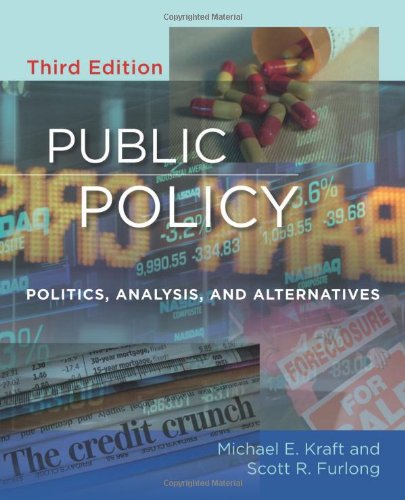Public policy textbooks need to give students a thorough explanation of the policy process, but why do so many relegate policy analysis to a single, final chapter―or not cover it at all? In the third edition of their innovative text, Kraft and Furlong take a decidedly different tack. They introduce and integrate an evaluative approach to policy throughout their text, encouraging critical and creative thinking on issues ranging from economic policy and the financial bailout to homeland security and natural disasters.
Public Policy starts with the basics and concisely reviews institutions, policy actors, and major theoretical models. The authors then discuss the nature of policy analysis and its practice, and show students how to employ evaluative criteria in six substantive policy areas. At its core, Public Policy guides students through policy alternatives, arming them with analytic tools for understanding how the motivations of policy actors―both within and outside of government―influence a complex, yet comprehensible, policy agenda. Professors will appreciate its authoritative, balanced approach, and its accessibility will engage students and keep them reading.
Important features for enhanced readability include:
Working with Sources and Steps to Analysis feature boxes that help students apply evaluative criteria;
Policy scenario chapter openers;
End-of-chapter discussion questions, suggested readings and websites, and keyword lists;
A wealth of tables, figures, charts, and photos; and
A helpful keyword glossary in the appendix.
In addition to updating throughout all chapters to account for recent events, issues, and policy debates through the end of the Bush presidency, the third edition includes expanded and new coverage of:
the mortgage crisis, financial bailout, and ensuing recession;
the wars in Afghanistan and Iraq;
the use of private contractors for military support and operations;
homeland security and its implications for civil liberties;
national energy policy and high gasoline prices, including proposals for increased offshore drilling;
climate change issues and politics;
the government′s capacity to handle natural disasters, such as Hurricanes Katrina, Gustav, and Ike; and
immigration controversies, including construction of fencing along the U.S.-Mexican border.
Michael E. Kraft is professor emeritus of political science
and public affairs at the University of Wisconsin–Green
Bay. He is the author of, among other works, Environmental
Policy and Politics, 8th ed. (2022), and coauthor of
Coming Clean: Information Disclosure and Environmental
Performance (2011), with Mark Stephan and Troy D. Abel.
In addition, he is the coeditor of Environmental Policy:
New Directions in the 21st Century, 12th ed. (2025), with
Barry G. Rabe and Norman J. Vig; Toward Sustainable
Communities: Transition and Transformations in Environmental Policy, 2nd ed. (2009), with
Daniel A. Mazmanian; and Business and Environmental Policy: Corporate Interests in the
American Political System (2007) and The Oxford Handbook of U.S. Environmental Policy (2013),
with Sheldon Kamieniecki. For over forty years, he taught courses in environmental policy and
politics, American government, Congress, and public policy analysis.
Scott R. Furlong is provost/vice president for academic
affairs at the State University of New York at Oswego as
of July 2017, after serving ten years as dean of the College
of Arts, Humanities and Social Sciences and professor
of political science and public affairs at the University of
Wisconsin–Green Bay. His areas of expertise are regulatory
policy and interest group participation in the executive
branch, and he has taught public policy for over twenty
years. He is the author or coauthor of many book chapters
and coauthor of Rulemaking: How Government Agencies
Write Laws and Make Policy, 5th ed. (2019), with Cornelius
M. Kerwin. His articles have appeared in such journals as Public Administration Review, Journal
of Public Administration Research and Theory, Administration and Society, American Review of
Public Administration, and Policy Studies Journal.
